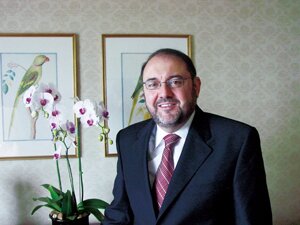| Abraham Israel hungry to make a difference |

|

|
|
Abraham Israel was a successful accountant turned businessman who made a good living making shoes in China. He made aliyah. One day, he helped a woman – a total stranger – cross a busy street. The woman needed more than a little help. As it turned out, “R” had multiple sclerosis. When Israel had gotten her across the street, he felt he needed to help her up to her flat. When they arrived there, he was shocked by its emptiness. R had no food. “What will you eat?” Israel asked her. “I’ll probably get a yogurt later today,” she replied. Abraham Israel was no ordinary retired businessman. Born in Egypt, young Abraham and his family fled to Paris with only the clothes on their backs. He remembers his pants growing shorter and shorter as he grew, and the soup kitchens there that sustained the family. “It saved us. We had enough to eat.”
Eventually, the family split to all corners of the Jewish world, and Abraham’s parents went to New York. The Goldene Medina gave Abraham opportunities for education and success, but he never forgot what it felt like to be hungry. “I used to travel through Israel on a regular basis,” he remembers. “With my samples, on the way to China. But when you just travel through Israel, staying in nice hotels, you don’t see the poverty.” He asked R if there was anyone else she knew who was as hungry as she was. It turned out that her neighbour was also hungry. The neighbour was reluctant to let R and her new friend into the flat, but Israel could see through the crack in the door its emptiness and the mattresses propped against the wall – where the children slept at night. It was with an initial group of seventeen hungry Israelis that Abraham Israel began Hazon Yeshaya, a network of soup kitchens that has grown from its 1998 beginnings to feed, today, more than eight thousand people. And Israel has just purchased the premises of a defunct supermarket in Ashkelon, from which he hopes to produce food for a further thousand, that will be distributed all over southern Israel. The truth is that the gap between rich and poor in Israel is wide and growing, and Abraham Israel doesn’t see any light at the end of the tunnel. Now, the economy is booming. But Netanyahu slashed allowances for food. Indeed, R – the “index patient” – had a food allowance. The subsidy, however, went to pay for her multiple sclerosis medications. And Israel sees government as part of the problem, not part of the solution. “There’s a 16.5% VAT tax on meat. And I can’t get them to waive it for us. Plus, the price of bread was just increased by 11%, and the new [Olmert] government is planning another hike in bread and milk prices.” Hazon Yeshaya runs soup kitchens. The soup kitchens feed families, schoolchildren, Holocaust survivors, the elderly, the entire religious-secular spectrum, 365 days a year. “The worst thing is to think that survivors are hungry,” says Israel sadly. “No one – especially no one who went through what those people went through – should have to be hungry today in Israel.” Israel was just in Hong Kong seeking donations. He is not your average fundraiser. As founder and CEO of Hazon Yeshaya, he could easily employ someone to do his fundraising, but he prefers to do it himself. Israel has applied the knowledge and experience he gained in business to his non-profit enterprise. His overhead is 3%. And Israel keeps track of whom he’s feeding, to make sure the food goes to the truly needy. “We work almost like a franchise now. We find properties in poor areas – usually it’s not hard, there’s a premises where a business has closed – and then I call the same architect. We use the same kitchen equipment; we’ve learned how to plan for efficient use of space. We can be up and running quickly.” Finding many children who have lost permanent teeth due to neglect (dental checkups not being free, and care being expensive), Hazon Yeshaya has opened free dental clinics, recruiting volunteer dentists to provide free care to at-risk children and adults. Holiday food packages are distributed to thousands of families who cannot afford basic food staples. The institution also operates a clothing warehouse masquerading as a department store, where needy people can “shop” like everyone else, trying on their selections and being assisted by volunteers. Israel remembers those vanishing pants legs and how embarrassing it was for a young boy. Another area of development is vocational training courses for people left behind in the current economic boom. Israel finds recently discharged soldiers, school drop-outs, and people with obsolete skills, for retraining courses as diverse as hairdressing, computer technology, and industrial cooking. And 80% of Hazon Yeshaya’s efforts are directed at youth. One in three Israeli children are under-nourished, Hazon Yeshaya provides daily hot lunches in Israeli schools and afternoon programmes, directly to children identified by school staff as not receiving sufficient food at home, so that these children can concentrate on learning and not on their empty tummies. Afternoon enrichment programmes organised by Hazon Yeshaya provide a structured environment, help with schoolwork, and allow access to computers and other resources to give needy children a leg up for the future. Hazon Yeshaya’s nursery schools and pre-schools help provide poor children a better foundation for mandatory education that begins at age five. Children with special needs – Down’s syndrome children and those on the autism spectrum – from poor families can also get support through Hazon Yeshaya. It’s clear from a few moments with Abraham Israel that he is, above all, passionately committed to what he does. Hazon Yeshaya is more than a labour of love, it’s an institution dedicated to improving the world. Abraham Israel is no dreamy do-gooder, he’s a completely serious, no-nonsense businessman who has found a way to give back to a needy world. He harbours no illusions that things will miraculously get better after some future election. Diaspora Jews don’t want to believe that there really is grinding poverty in Israel. It clashes with our image of Israeli society as a high-tech miracle. Abraham Israel didn’t want to believe it either. |

















